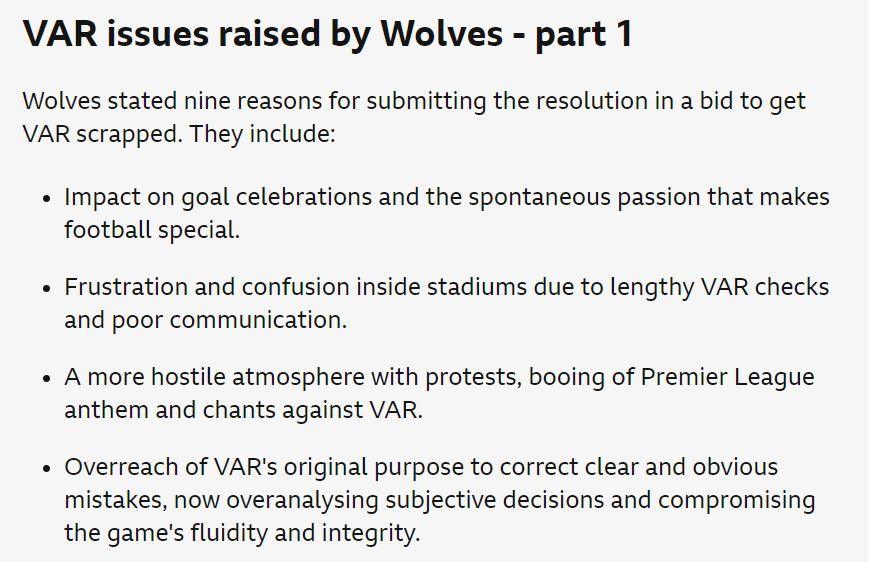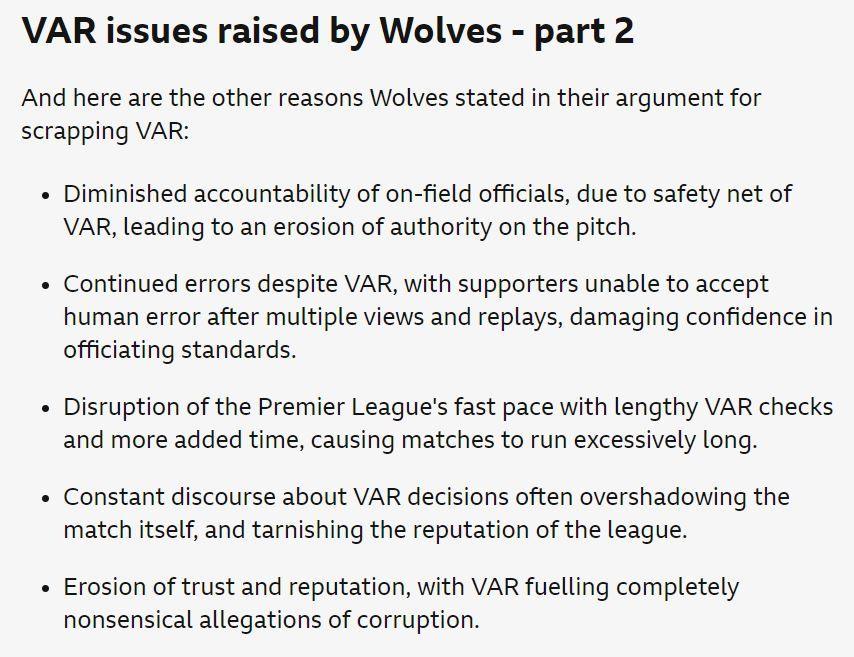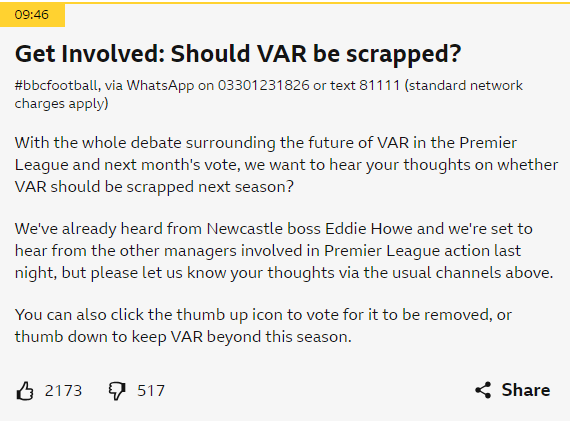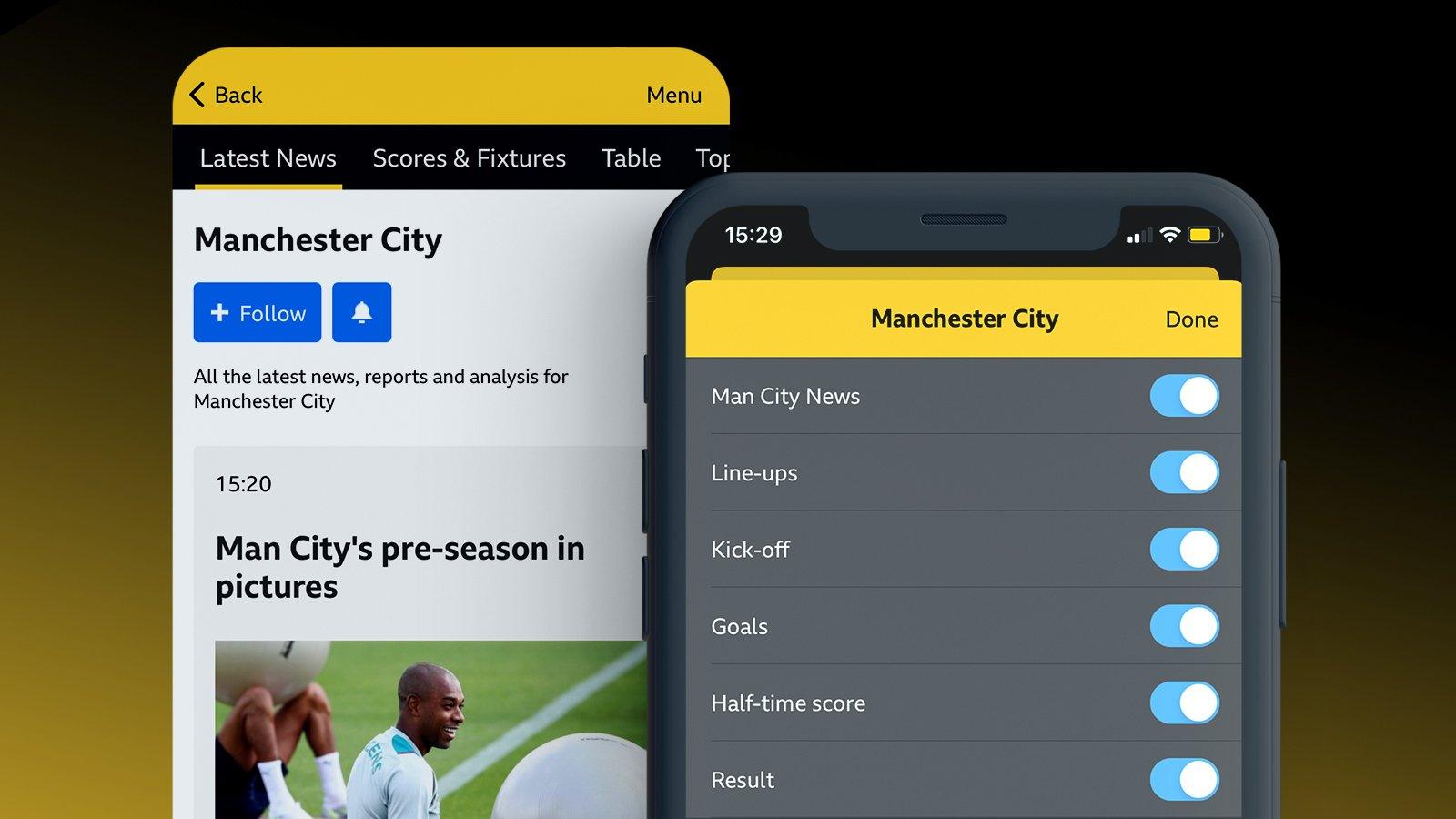Will Premier League VAR vote be passed & what happens next?
VAR; How referees make important VAR decisions
- Published
The Premier League faces a vote to scrap the use of video assistant referees (VAR) from next season.
All 20 member clubs will vote at their annual general meeting on 6 June.
The vote was triggered after Wolves formally submitted a resolution to the Premier League on Wednesday.
Wolves are not the only ones aggrieved at VAR, after a fifth season of debate, scrutiny, complaints and apologies since the technology was introduced in 2019-20.
But the Premier League remains supportive of VAR, and member clubs voted in April for the introduction of semi-automated offsides from the 2024-25 season.
And BBC Sport understands Liverpool, plus three other unnamed clubs, are not in favour of scrapping VAR.
The league says that VAR has improved correct decisions from 82%, prior to its introduction, to 96% this season.
So who else is for and against VAR and what happens next?
What will clubs vote on?
Member clubs will be asked whether they want to scrap VAR in its entirety.
Those in favour would be voting for a return to Premier League officiating before the 2019-20 season, when VAR was introduced.
That could also mean the use of semi-automated offsides - which Premier League clubs voted to introduce last month to improve decision-making - may not go ahead.
How many votes are needed for change?
Premier League rules state that any rule changes need a two-thirds majority, meaning 14 out of the 20 clubs need to vote in favour of scrapping VAR.
Who is for and against?
As yet, Wolves are the only club to publicly declare their intention to vote in favour of scrapping VAR.
Nottingham Forest declined to comment, but given their recent statements over VAR they could side with Wolves.
Leicester City and Ipswich Town will both be at the meeting after their promotion to the Premier League. Neither club has communicated their views on the vote but VAR does not operate in the Championship.
BBC Sport understands Liverpool are in favour of keeping VAR - despite calling for a "review with full transparency" of VAR in October after they said an incorrectly disallowed goal in their defeat by Spurs resulted in "sporting integrity being undermined".
Three other unnamed Premier League clubs told BBC Sport they were not in favour of scrapping VAR, with one suggesting there was widespread support for VAR but that most clubs wanted to see improvements in how it was deployed.
Several other clubs contacted by BBC Sport did not want to offer guidance.
Manchester City, Arsenal, Liverpool and Aston Villa have all qualified for next season's Champions League, where VAR is in operation. While no guarantee that those clubs would vote in favour of keeping VAR, playing VAR-operated Champions League football could be more difficult if its removed from the Premier League.
That could also be the case for those playing in the Europa League and Europa Conference League, where VAR is also in operation. Those places will be determined on the final day of the Premier League season on Sunday, with Manchester United, Newcastle United, Tottenham and Chelsea in contention.
So will the VAR vote get through?
It's impossible to say for certain, but it seems unlikely.
Wolves would need to gain support from 13 other clubs in the next three weeks for VAR to be scrapped.
Why is it unlikely?
There are several reasons.
Firstly, gaining a two-thirds majority is difficult and Wolves are yet to get public support from other clubs.
Secondly, the Premier League itself is against scrapping VAR and they plan to demonstrate to members the improvements that have been made since it was introduced in 2019.
The Premier League's own data says correct decisions in matches have increased from 82% before VAR was introduced to 96% currently. They argue that this figure will increase even further with the planned introduction of semi-automated offsides next season.
Lastly, scrapping VAR would make the Premier League an outlier, with Sweden the only elite league in Uefa's top 30 to not have VAR. European and international competitions such as the Champions League, European Championships and World Cup all use VAR.
VAR: Sweden only top league in UEFA to reject technology
So, what happens next?
It's unlikely that clubs will wait until the vote itself on 6 June before deciding how to vote.
Before then, there could be dialogue between clubs to get a feel for how members are feeling about the vote, and which way they are likely to side.
ESPN editor and VAR expert Dale Johnson told BBC Radio 5 Live that he thought the vote may instead trigger further discussion about how to improve the system.
"I really don't see it [VAR being scrapped]. You need 14 votes to get it through, the frustration has got a lot of ground but it is hard to see the clubs who compete in European football on a regular basis voting against it, and I know of a couple of clubs outside that who don't support it [the vote].
"What this does provide is the chance of a real and honest discussion of what VAR is in the Premier League, what the clubs want it to be and where it goes.
"The PGMOL [referees’ body the Professional Game Match Officials Limited] gets a lot of criticism, but it is the Premier League as an organisation who decides how it wants VAR to work, the length of intervention. At this meeting next month, the clubs can discuss where VAR is right now, maybe there will be changes to improve the perception in English football."
How did we reach the 'vote' point?
There are many, many articles on the BBC Sport website which can help answer this question, including a summary of this season's most controversial VAR incidents here.
Liverpool, Arsenal, Wolves and Forest have all issued official club statements criticising refereeing standards and VAR this season.
In February, Premier League chief football officer Tony Scholes acknowledged VAR decisions were taking too long and the in-stadium experience of fans was poor.
"It's nowhere near good enough," Scholes said. "It affects supporters' enjoyment of the game, and we know it needs to change."
The Premier League is keen to move towards trials of video and audio of decisions being played to the crowd - currently not allowed by lawmakers Fifa and Ifab - but Scholes believes that will happen in the future.
In calling for a vote, Wolves released an expansive statement which can be read below:


What do fans think?
Unsurprisingly, it's proving controversial.
There were more than 3,500 comments from the BBC Sport audience on Wednesday's article breaking the news of the vote.
On the BBC Sport website and app, more than 65,000 users have responded to one of four options.
On a separate post on the BBC Sport football news live page, users were asked if they wanted to remove VAR or to keep it beyond the end of this season.
As of Thursday afternoon, 2,173 voted in favour of scrapping VAR while just 517 voted to keep it - giving those in favour of removing VAR a lead of more than four-to-one.
Have your say in the vote at the bottom of this article.

